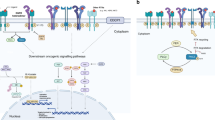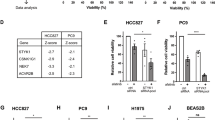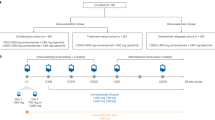Abstract
Targeted therapies are effective in subsets of lung cancers with EGFR mutations and anaplastic lymphoma kinase (ALK) translocations. Large-scale genomics have recently expanded the lung cancer landscape with FGFR1 amplification found in 10–20% of squamous cell carcinomas (SCCs). However, the response rates have been low for biomarker-directed fibroblast growth factor receptor (FGFR) inhibitor therapy in SCC, which contrasts to the relatively high rates of response seen in EGFR mutant and ALK-translocated lung cancers treated with epidermal growth factor receptor (EGFR) inhibitors and ALK inhibitors, respectively. In order to better understand the low response rates of FGFR1-amplified lung cancers to FGFR inhibitors, relationships between gene copy number, mRNA expression and protein expression of FGFR1 were assessed in cell lines, tumor specimens and data from The Cancer Genome Atlas. The importance of these factors for the sensitivity to FGFR inhibitors was determined by analyzing drug screen data and conducting in vitro and in vivo experiments. We report that there was a discrepancy between FGFR1 amplification level and FGFR1 protein expression in a number of these cell lines, and the cancers with unexpectedly low FGFR1 expression were uniformly resistant to the different FGFR inhibitors. Further interrogation of the receptor tyrosine kinase activity in these discordant cell lines revealed co-activation of HER2 and platelet-derived growth factor receptor-α (PDGFRα) caused by gene amplification or ligand overexpression maintained phosphoinositide 3-kinase (PI3K) and MEK/ERK signaling even in the presence of FGFR inhibitor. Accordingly, co-inhibition of FGFR1 and HER2 or PDGFRα led to enhanced drug responses. In contrast, FGFR1-amplified high FGFR1 protein-expressing lung cancers are sensitive to FGFR inhibitor monotherapy by downregulating ERK signaling. Addition of a PI3K inhibitor to these high FGFR1 protein-expressing cancers further sensitized them to FGFR inhibitor. These data reveal that biomarker-directed trials for FGFR1-amplified SCC require assessment of FGFR1 protein expression and uncover novel therapeutic strategies for FGFR1-amplified SCC with low FGFR1 protein expression.
This is a preview of subscription content, access via your institution
Access options
Subscribe to this journal
Receive 50 print issues and online access
$259.00 per year
only $5.18 per issue
Buy this article
- Purchase on Springer Link
- Instant access to full article PDF
Prices may be subject to local taxes which are calculated during checkout







Similar content being viewed by others
References
Lynch TJ, Bell DW, Sordella R, Gurubhagavatula S, Okimoto RA, Brannigan BW et al. Activating mutations in the epidermal growth factor receptor underlying responsiveness of non-small-cell lung cancer to gefitinib. N Engl J Med 2004; 350: 2129–2139.
Soda M, Choi YL, Enomoto M, Takada S, Yamashita Y, Ishikawa S et al. Identification of the transforming EML4-ALK fusion gene in non-small-cell lung cancer. Nature 2007; 448: 561–566.
Meador CB, Micheel CM, Levy MA, Lovly CM, Horn L, Warner JL et al. Beyond histology: translating tumor genotypes into clinically effective targeted therapies. Clin Cancer Res 2014; 20: 2264–2275.
Gandara DR, Hammerman PS, Sos ML, Lara PN Jr, Hirsch FR . Squamous cell lung cancer: from tumor genomics to cancer therapeutics. Clin Cancer Res 2015; 21: 2236–2243.
Dieci MV, Arnedos M, Andre F, Soria JC . Fibroblast growth factor receptor inhibitors as a cancer treatment: from a biologic rationale to medical perspectives. Cancer Discov 2013; 3: 264–279.
Brooks AN, Kilgour E, Smith PD . Molecular pathways: fibroblast growth factor signaling: a new therapeutic opportunity in cancer. Clin Cancer Res 2012; 18: 1855–1862.
Dienstmann R, Rodon J, Prat A, Perez-Garcia J, Adamo B, Felip E et al. Genomic aberrations in the FGFR pathway: opportunities for targeted therapies in solid tumors. Ann Oncol 2014; 25: 552–563.
Weiss J, Sos ML, Seidel D, Peifer M, Zander T, Heuckmann JM et al. Frequent and focal FGFR1 amplification associates with therapeutically tractable FGFR1 dependency in squamous cell lung cancer. Sci Transl Med 2010; 2: 62ra93.
Dutt A, Ramos AH, Hammerman PS, Mermel C, Cho J, Sharifnia T et al. Inhibitor-sensitive FGFR1 amplification in human non-small cell lung cancer. PLoS One 2011; 6: e20351.
Heist RS, Mino-Kenudson M, Sequist LV, Tammireddy S, Morrissey L, Christiani DC et al. FGFR1 amplification in squamous cell carcinoma of the lung. J Thorac Oncol 2012; 7: 1775–1780.
Schildhaus HU, Heukamp LC, Merkelbach-Bruse S, Riesner K, Schmitz K, Binot E et al. Definition of a fluorescence in-situ hybridization score identifies high- and low-level FGFR1 amplification types in squamous cell lung cancer. Mod Pathol 2012; 25: 1473–1480.
Kohler LH, Mireskandari M, Knosel T, Altendorf-Hofmann A, Kunze A, Schmidt A et al. FGFR1 expression and gene copy numbers in human lung cancer. Virchows Arch 2012; 461: 49–57.
Kim HR, Kim DJ, Kang DR, Lee JG, Lim SM, Lee CY et al. Fibroblast growth factor receptor 1 gene amplification is associated with poor survival and cigarette smoking dosage in patients with resected squamous cell lung cancer. J Clin Oncol 2013; 31: 731–737.
Tran TN, Selinger CI, Kohonen-Corish MR, McCaughan BC, Kennedy CW, O'Toole SA et al. Fibroblast growth factor receptor 1 (FGFR1) copy number is an independent prognostic factor in non-small cell lung cancer. Lung Cancer 2013; 81: 462–467.
Seo AN, Jin Y, Lee HJ, Sun PL, Kim H, Jheon S et al. FGFR1 amplification is associated with poor prognosis and smoking in non-small-cell lung cancer. Virchows Arch 2014; 465: 547–558.
Cancer Genome Atlas Research Network. Comprehensive genomic characterization of squamous cell lung cancers. Nature 2012; 489: 519–525.
Helsten T, Elkin S, Arthur E, Tomson BN, Carter J, Kurzrock R . The FGFR landscape in cancer: analysis of 4853 tumors by next generation sequencing. Clin Cancer Res 2015; e-pub ahead of print 15 September 2015.
Nogova L, Sequist LV, Cassier PA, Hidalgo M, Delord JP, Schuler MH et al. Targeting FGFR1-amplified lung squamous cell carcinoma with the selective pan-FGFR inhibitor BGJ398. J Clin Oncol 2014; 32 (suppl): abstr 8034.
Paik PK, Shen R, Ferry D, Soria JC, Mathewson A, Kilgour E et al. A phase 1b open-label multicenter study of AZD4547 in patients with advanced squamous cell lung cancers: Preliminary antitumor activity and pharmacodynamic data. J Clin Oncol 2014; 32 (suppl); abstr 8035.
Slamon DJ, Leyland-Jones B, Shak S, Fuchs H, Paton V, Bajamonde A et al. Use of chemotherapy plus a monoclonal antibody against HER2 for metastatic breast cancer that overexpresses HER2. N Engl J Med 2001; 344: 783–792.
Engelman JA, Janne PA . Mechanisms of acquired resistance to epidermal growth factor receptor tyrosine kinase inhibitors in non-small cell lung cancer. Clin Cancer Res 2008; 14: 2895–2899.
Faber AC, Li D, Song Y, Liang MC, Yeap BY, Bronson RT et al. Differential induction of apoptosis in HER2 and EGFR addicted cancers following PI3K inhibition. Proc Natl Acad Sci USA 2009; 106: 19503–19508.
Laplante M, Sabatini DM . mTOR signaling at a glance. J Cell Sci 2009; 122: 3589–3594.
Rikova K, Guo A, Zeng Q, Possemato A, Yu J, Haack H et al. Global survey of phosphotyrosine signaling identifies oncogenic kinases in lung cancer. Cell 2007; 131: 1190–1203.
McDermott U, Ames RY, Iafrate AJ, Maheswaran S, Stubbs H, Greninger P et al. Ligand-dependent platelet-derived growth factor receptor (PDGFR)-alpha activation sensitizes rare lung cancer and sarcoma cells to PDGFR kinase inhibitors. Cancer Res 2009; 69: 3937–3946.
Lewis Phillips GD, Li G, Dugger DL, Crocker LM, Parsons KL, Mai E et al. Targeting HER2-positive breast cancer with trastuzumab-DM1, an antibody-cytotoxic drug conjugate. Cancer Res 2008; 68: 9280–9290.
Wilson TR, Lee DY, Berry L, Shames DS, Settleman J . Neuregulin-1-mediated autocrine signaling underlies sensitivity to HER2 kinase inhibitors in a subset of human cancers. Cancer Cell 2011; 20: 158–172.
Hata AN, Engelman JA, Faber AC . The BCL2 family: key mediators of the apoptotic response to targeted anticancer therapeutics. Cancer Discov 2015; 5: 475–487.
Wynes MW, Hinz TK, Gao D, Martini M, Marek LA, Ware KE et al. FGFR1 mRNA and protein expression, not gene copy number, predict FGFR TKI sensitivity across all lung cancer histologies. Clin Cancer Res 2014; 20: 3299–3309.
Zhang J, Zhang L, Su X, Li M, Xie L, Malchers F et al. Translating the therapeutic potential of AZD4547 in FGFR1-amplified non-small cell lung cancer through the use of patient-derived tumor xenograft models. Clin Cancer Res 2012; 18: 6658–6667.
Robertson KD . DNA methylation, methyltransferases, and cancer. Oncogene 2001; 20: 3139–3155.
Montenegro MF, Sanchez-del-Campo L, Fernandez-Perez MP, Saez-Ayala M, Cabezas-Herrera J, Rodriguez-Lopez JN . Targeting the epigenetic machinery of cancer cells. Oncogene 2015; 34: 135–143.
Guagnano V, Kauffmann A, Wohrle S, Stamm C, Ito M, Barys L et al. FGFR genetic alterations predict for sensitivity to NVP-BGJ398, a selective pan-FGFR inhibitor. Cancer Discov 2012; 2: 1118–1133.
Gavine PR, Mooney L, Kilgour E, Thomas AP, Al-Kadhimi K, Beck S et al. AZD4547: an orally bioavailable, potent, and selective inhibitor of the fibroblast growth factor receptor tyrosine kinase family. Cancer Res 2012; 72: 2045–2056.
O'Hare T, Shakespeare WC, Zhu X, Eide CA, Rivera VM, Wang F et al. AP24534, a pan-BCR-ABL inhibitor for chronic myeloid leukemia, potently inhibits the T315I mutant and overcomes mutation-based resistance. Cancer Cell 2009; 16: 401–412.
Terai H, Soejima K, Yasuda H, Nakayama S, Hamamoto J, Arai D et al. Activation of the FGF2-FGFR1 autocrine pathway: a novel mechanism of acquired resistance to gefitinib in NSCLC. Mol Cancer Res 2013; 11: 759–767.
Harbinski F, Craig VJ, Sanghavi S, Jeffery D, Liu L, Sheppard KA et al. Rescue screens with secreted proteins reveal compensatory potential of receptor tyrosine kinases in driving cancer growth. Cancer Discov 2012; 2: 948–959.
Wang J, Mikse O, Liao RG, Li Y, Tan L, Janne PA et al. Ligand-associated ERBB2/3 activation confers acquired resistance to FGFR inhibition in FGFR3-dependent cancer cells. Oncogene 2015; 34: 2167–2177.
Wolff AC, Hammond ME, Hicks DG, Dowsett M, McShane LM, Allison KH et al. Recommendations for human epidermal growth factor receptor 2 testing in breast cancer: American Society of Clinical Oncology/College of American Pathologists clinical practice guideline update. J Clin Oncol 2013; 31: 3997–4013.
Pros E, Lantuejoul S, Sanchez-Verde L, Castillo SD, Bonastre E, Suarez-Gauthier A et al. Determining the profiles and parameters for gene amplification testing of growth factor receptors in lung cancer. Int J Cancer 2013; 133: 898–907.
Malchers F, Dietlein F, Schottle J, Lu X, Nogova L, Albus K et al. Cell-autonomous and non-cell-autonomous mechanisms of transformation by amplified FGFR1 in lung cancer. Cancer Discov 2014; 4: 246–257.
Turner N, Grose R . Fibroblast growth factor signalling: from development to cancer. Nat Rev Cancer 2010; 10: 116–129.
Kunii K, Davis L, Gorenstein J, Hatch H, Yashiro M, Di Bacco A et al. FGFR2-amplified gastric cancer cell lines require FGFR2 and Erbb3 signaling for growth and survival. Cancer Res 2008; 68: 2340–2348.
Herbst RS, Gandara DR, Hirsch FR, Redman MW, LeBlanc M, Mack PC et al. Lung master protocol (Lung-MAP)-a biomarker-driven protocol for accelerating development of therapies for squamous cell lung cancer: SWOG S1400. Clin Cancer Res 2015; 21: 1514–1524.
Ebi H, Corcoran RB, Singh A, Chen Z, Song Y, Lifshits E et al. Receptor tyrosine kinases exert dominant control over PI3K signaling in human KRAS mutant colorectal cancers. J Clin Invest 2011; 121: 4311–4321.
Ooi A, Inokuchi M, Harada S, Inazawa J, Tajiri R, Kitamura SS et al. Gene amplification of ESR1 in breast cancers—fact or fiction? A fluorescence in situ hybridization and multiplex ligation-dependent probe amplification study. J Pathol 2012; 227: 8–16.
Niederst MJ, Sequist LV, Poirier JT, Mermel CH, Lockerman EL, Garcia AR et al. RB loss in resistant EGFR mutant lung adenocarcinomas that transform to small-cell lung cancer. Nat Commun 2015; 6: 6377.
Cerami E, Gao J, Dogrusoz U, Gross BE, Sumer SO, Aksoy BA et al. The cBio cancer genomics portal: an open platform for exploring multidimensional cancer genomics data. Cancer Discov 2012; 2: 401–404.
Gao J, Aksoy BA, Dogrusoz U, Dresdner G, Gross B, Sumer SO et al. Integrative analysis of complex cancer genomics and clinical profiles using the cBioPortal. Sci Signal 2013; 6: pl1.
Acknowledgements
We thank Dr Shuta Tomida at Okayama University for his assistance with the statistics. This work was supported by Grants-in-Aid for Scientific Research (H Ebi, 26830105 and S Yano, 21390256), Scientific Research on Innovative Areas ‘Integrative Research on Cancer Microenvironment Network’ (H Ebi and S Yano, 22112010A01) and Grant-in-Aid for Project for Development of Innovative Research on Cancer Therapeutics (P-Direct) from the Ministry of Education, Culture, Sports, Science and Technology (MEXT) of Japan.
Author information
Authors and Affiliations
Corresponding authors
Ethics declarations
Competing interests
The authors declare no conflict of interest.
Additional information
Supplementary Information accompanies this paper on the Oncogene website
Rights and permissions
About this article
Cite this article
Kotani, H., Ebi, H., Kitai, H. et al. Co-active receptor tyrosine kinases mitigate the effect of FGFR inhibitors in FGFR1-amplified lung cancers with low FGFR1 protein expression. Oncogene 35, 3587–3597 (2016). https://doi.org/10.1038/onc.2015.426
Received:
Revised:
Accepted:
Published:
Issue Date:
DOI: https://doi.org/10.1038/onc.2015.426
This article is cited by
-
Prognostic implications of Fibroblast growth factor receptor 1 (FGFR1) gene amplification and protein overexpression in hypopharyngeal and laryngeal squamous cell carcinoma
BMC Cancer (2020)
-
Differential responses to kinase inhibition in FGFR2-addicted triple negative breast cancer cells: a quantitative phosphoproteomics study
Scientific Reports (2020)
-
A Phase Ib/II, open-label, multicenter study of INC280 (capmatinib) alone and in combination with buparlisib (BKM120) in adult patients with recurrent glioblastoma
Journal of Neuro-Oncology (2020)
-
Reciprocal regulatory mechanism between miR-214-3p and FGFR1 in FGFR1-amplified lung cancer
Oncogenesis (2019)
-
FGFR1-ERK1/2-SOX2 axis promotes cell proliferation, epithelial–mesenchymal transition, and metastasis in FGFR1-amplified lung cancer
Oncogene (2018)



